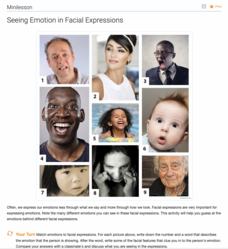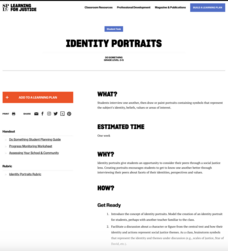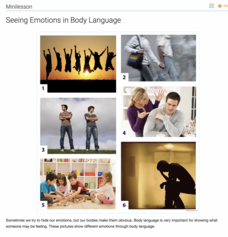Missouri Department of Elementary
I’m Thumbody!
Positive and negative thinking is the focus of a lesson that boost self-awareness. Beginning with a whole-class discussion, scholars brainstorm what positive thinking looks and sounds like then compares and contrast the two types of...
Missouri Department of Elementary
An Apple a Day
Three apples—green, red, and rotten—exemplify character traits, negative and positive. Following a discussion about the classroom community, scholars complete an apple-themed worksheet that challenges them to read each trait, color it...
Missouri Department of Elementary
What Color is Your Apple?
Build your classroom community with an activity that uses apples to examine oneself and their classmates. Participants draw four large apples on blank paper then exchange them within a small group. Group members write a character trait...
Missouri Department of Elementary
Fly Your Kite
Encourage scholars to become a productive community member with a kite-themed lesson. Following a review and discussion, learners complete a Venn diagram that displays the connection between character traits needed to make a home and...
Western Justice Center
Power
A short video asks viewers to think about power in new ways. The narrator suggests that there are different types of power, 10 different sources of power. After watching the video, class members study a series of scenarios and identify...
Western Justice Center
Communication Skills
Good communication skills are key to resolving conflicts. A short video introduces learners to the concept of active listening and provides tips that will help them resolve conflicts. Class members then read articles, analyze scenarios,...
Western Justice Center
Emotions, Regulation Strategies
To regulate emotions in a conflict it is first necessary to be able to identify those emotions. To that end, class members engage in a series of activities, watch a series of videos, and compete worksheets that help them understand and...
Western Justice Center
Underlying Needs
Conflicts arise when underlying needs are unmet. An engaging video introduces viewers to nine basic human needs. Then, through a series of videos, worksheets, and activities, class members learn that by focusing on interests and needs,...
Western Justice Center
Self Awareness
Being aware of one's perceptions and biases is especially important when involved in a conflict. After watching an introductory video and four scenarios, viewers write out how they would feel or react to each situation. The subsequent...
Western Justice Center
Analyzing Conflict
Conflicts happen, conflicts grow, and learning how to deal with conflict is what this lesson wants learners to know. A series of short videos teach viewers how to identify the source of a conflict, how to identify different types of...
Thoughtful Learning
Taking Action Against Bullying
A mini-lesson offers suggestions for young learners on how to take action against bullying, both for themselves and others. Individuals then craft a paragraph about strategies they might use.
Thoughtful Learning
Seeing Emotion in Facial Expressions
Learning to read body language, especially facial expressions, is the focus of a mini-lesson. Young learners examine a series of photographs, identify the emotion being illustrated, and then discuss the cues that revealed the emotion.
Teaching Tolerance
Identity Portraits
When you look at me, what do you see? Young learners answer this question by creating a portrait that reflects the identity of one of their peers. First, class members create interview questions. Then, they interview classmates to...
Chicago Botanic Garden
Meet the Naturalists
Studying plants is a full-time job—for some. After learning the ins and outs of phenology in the first three lessons in the unit, pupils explore the history of the science. The instructional activity highlights five historical...
Aquarium of the Pacific
Ocean Drifters
Take a drift in the ocean. Class members watch a video on plankton, the drifters of the ocean. Scholars find out about the different types of plankton and sea jellies. To add a little variety, they use the aquarium webcams to study sea...
Aquarium of the Pacific
Sensational Sharks
Pray that you are not the prey of sharks! The class watches a video and a webcam on sharks and make observations about the different types of sharks. Learners compare two sharks and list their similarities and differences. They then...
Chicago Botanic Garden
Ecological Mismatches
Modeling is a powerful teaching tool. The final installment in a six-part series has pupils complete an activity to model a food web and discover the interconnected relationships in an ecosystem. They then read about changes in migratory...
Chicago Botanic Garden
Seasons of a Plant
Reading the cues from nature can be as much an art as a science. The second installment in a six-part unit on climate teaches learners that environmental and biological events have significance. They first learn the difference between...
Chicago Botanic Garden
Migration, Adaptation, and Changing Climates
People adjust to their environments without even thinking about it—even if it's simply throwing on a sweatshirt. Lead the class in a discussion about the adjustments people make in their daily lives as an introduction to adaptations,...
Thoughtful Learning
Using Perspective Shifting to Understand Others
Being able to see things from another's perspective is an important part of social awareness. A short activity permits scholars to practice perspective-taking, which in turn helps them develop empathy, appreciate diversity, and promote...
Thoughtful Learning
Seeing Emotions in Body Language
Scholars test their skills of reading body language with a collaborative learning experience that focuses on showing and identifying emotions. Pairs take turns acting out an emotion, one uses body language while the other guesses what...
Indiana Department of Education
Social Emotional Learning Competencies PK-12 Lesson Plans
Looking for lesson plans that address social and emotional learning competencies? Here's help in the form of a 166-page packet that includes lesson plans for elementary, middle, and high school learners. Seven detailed plans are provided...
Transforming Education
Social Awareness Strategies
What are the benefits of developing social awareness? Using the resource, readers learn strategies for fostering civil discourse, creating a participatory classroom, and enhancing family involvement. Scholars also take a personality...
BrainPOP
Famous Historical Figures Lesson Plan: Who Am I?
History detectives select a famous person to research, fill a bag with items associated with their subject, then ask class members to guess the historical figure represented by the artifacts.

























